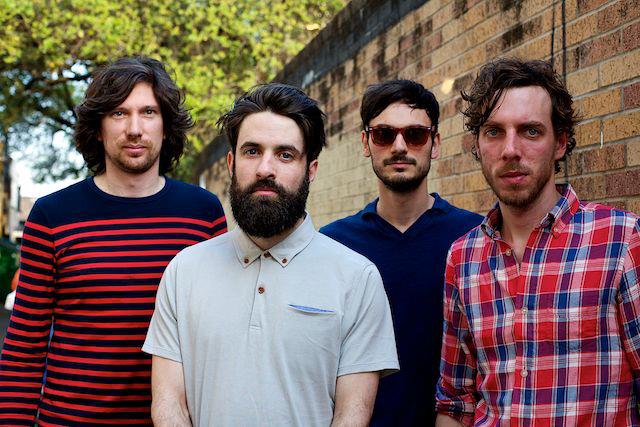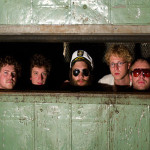Midway through their first headlining UK tour and with their – already critically acclaimed – debut album ‘Ways To Forget’ set for release next week, Clock Opera, the London four-piece are a name figuring largely in minds, and, ears. Guy Connelly, the outfit’s frontman, lyricist and master of ‘chop pop’, tells us how it’s all going so far.
Guy, the early reviews for the album and reactions have all been very commendatory. You probably can’t do better than
having your debut deemed a ‘masterpiece’ [Sunday Times Culture], can you.
Yeah…yeah. It’s amazing really. We’ve been working on it for such a long time that you…you just hope that people are going to
respond that way when it finally comes out. It’s all very exciting so far!
Do you pay much attention to reviews? Do they affect you at all – good or bad – given the effort and time you have put into creating something?
I think…well, in theory I would say I prefer to ignore both good and bad ones. But you can’t help be affected a little bit, I think, because some people read reviews and form their opinions from that. It won’t change what I think of the music though, and it won’t change the way we play it.
One certain publication were quite damning – unbelievably so…
Yeah, well that’s their prerogative. We’re not negatively affected by that. That particular one we think is hilarious! I haven’t actually seen the full thing, but I’ve heard it’s quite vitriolic.
During the time of recording the album last year, did you get the feeling, from those outside of your immediate circle and
record label, that you had got a big record there?
I suppose we get that from playing gigs to people, more than just from individual responses; the kind of feeling we get from what happens at our shows and from people who have never heard us before, and how they react to when we play our songs. I take a lot away from that – that definitely sustains our own excitement.
We’ve been playing the songs for a little while now, and after a while you do forget how you felt when you first wrote them and your reactions become more and more focused on how others respond to it when you play.
Is it important to you to be commercially successful, as well as critically so?
Only in as much as it pays my rent! I’m not gong to change anything in order to achieve that – commercial success. We don’t have any game plan there.
You’ve said previously that the writing process, and in particular your own way of going about it, is a lengthy process. How do you usually put a song together?
It largely works with the lyrics coming last
Last – really? I would somehow have imagined the opposite…?
I think on a couple of occasions they’ve been kind of parallel, fitting very neatly together, but generally the music comes first. We’ll usually start off with building up the samples with whatever we’ve got laying around, or perhaps a very simple melody on an instrument, and extrapolate out of that a sample section that we can then make melodies over the top of. And then, quite often, that results in the base of the song, with the melody and lyrics coming over the top of. That’s been the order of events for these songs. Of the ten that feature on ‘Ways To Forget’, are there one or two that you are particularly pleased with, either lyric-wise or the way they have turned out in the final mix?
Er, it’s difficult to say, actually: I have different relationships with all of them. I think I’ll always be especially proud of ‘Once And For All’ and ‘Belongings’, I guess because they always kind of regenerate themselves every time you play them. I still get the same feeling off of those two when we play them live, as I did when I first wrote both of them.
You’ve produced ‘Ways To Forget’ yourself, is that because of a ‘control’ thing, not wanting to hand over the reins to someone else?
No. I didn’t set out with a controlling instinct. Yes, I suppose I wanted to make what I wanted to make at the start when it was
just me. Because of the way we make out songs the production happens at the same time as writing, really. I suppose you get
someone else to stick it all together, but essentially a lot of the production is done all the way through. We don’t come up with a song and then think how should we produce it. I don’t know what’ll happen next time; maybe we’ll take a different route. But for this one it just made perfect sense to produce it ourselves.
Your name has become synonymous now with this whole ‘chop pop’ thing. Where did that start – is it something of an obsession with you?
[Laughs] No. I mean, I have been called obsessive, but I don’t actually remember where that (chop pop) came from. It has variously been attributed to me, but I can’t remember ever describing it as such. It has nods to the way our music is made, I suppose, and it’s pop tendencies. But there’s something missing in it for me.
In what way?
Well, it kind of misses the intricacies and sort of emotion of what we do as well. But, whatever – if it’s helpful, then great (laughs) , but ultimately once you know an album of someone you don’t really need a label anymore, so hopefully we may get to that point.
You recently put together the multimix on Soundcloud, made up of contributions of sounds from fans. How did that idea come to mind?
I think we were just really keen to involve people in the way we make things, you know. We spend most of our time in dark
window-less rooms rehearsing, writing or recording, and when you’re doing that – and before you go out on tour – it was a way
to interact with people who like us on more than just a ‘here’s our music, listen to it’ level. The opportunities are there now to involve people in how you make stuff and allow their sounds to be a part of what we do.
Did you receive many responses?
Yeah, there were loads – overflowing really. I didn’t even use all of them in the end. I tried to incorporate as many as I could, but it was just put together over the course of a weekend, so –
How did you decide what you would use?
I did it the same way as I would start a remix, really. Firstly laying out the tracks, then very quickly deciding I’d take that bit here, or that bit there would be useful somewhere, and then knotting them together into something I liked. I suppose that was another reason that I liked the idea, because after having taken two or three years to write and put an album out, the idea of getting some sounds and then making something of them that would get released a few days later was really refreshing and exciting for us.
It worked very well, I think. Were you happy with the end result?
Yeah. I wasn’t sure what it was going to be really (laughs), whether it was going to be a song or an instrumental thing, and it turned out to be somewhere in the middle. I was glad some people sent in vocals because even though we said it could be anything, musical or otherwise, most of what we received weren’t musical, so there wasn’t any kind of vocal melody; that had to be constructed. But, yeah, it was loads of fun to make, and I think we may do it again sometime.
You touched there on the remixes you’ve done [which include Marina and the Diamonds, Everything Everything, Metronomy, Feist, amongst others] of which there have been a fair number now. Where do you find the time! Would you say that you’re something of a workaholic?
[Laughs] Yeah, we’re always pretty busy! There’s not really any downtime in our world. I suppose I am quite a workaholic – I think you have to be.
To go back to the beginning, how did you come together as Clock Opera?
The beginning was really just me in a bedroom coming up with sounds – pretty much just for myself – that gradually formed themselves into songs. There wasn’t really any idea of starting a band, or to put a record out, it was just purely for my own pleasure.
But then it quickly became something else: getting the others involved and wanting to play them to people. It didn’t feel that it was fulfilling itself, just me sitting there, so we started playing shows. That was about two-and-half years ago, I think.
It seemed that it was from last autumn time – from around when you opened on some dates of Chapel Club’s UK tour – that the name ‘Clock Opera’ was one that people were starting to sit up and take notice of.
Well…yeah. We weren’t in a rush to make anything happen: just laying the foundation and letting word get around, not trying too
hard. Our first single came out on a tiny little label, and the next on a slightly more widespread one, and I think the impact of those – and with the remixes – gradually grew and spread the word until we kind of got to where we are now.
Were the other guys [Andy West, bass; Che Albrighton, drums; Dan Armstrong, percussion/samples] already friends or people you knew?
I used to live with Andy, and he used to be in a band with Che that I recorded once; and Dan was a friend of mine, so it all came together very naturally. Then the response we started getting right from our first gig was really great and made us immediately want to do more. So it all spiralled from there.
And the name ‘Clock Opera’?
I came across this composer who wrote a symphony for pocket watches. He never actually made it – it was never performed – but
I thought it was a great idea. And with the mechanical connections to our music, I thought maybe we could do it for him.
How did Moshi Moshi come to hear of you?
They just picked up on us through the remixes and our first releases. That was about ten months ago. We put out ‘Belongings’ through them, and then via them got involved with Island. All through that time we were writing and recording for our album – which was happening anyway – and then we just finished it off.
And do they allow you freedom to produce what you want?
Yeah, totally. They haven’t really been involved in the recording or creative decisions at all. That’s a nice place for us to be in.
You’re just about to start this UK tour, and from having seen you on stage, you come across as quite an intense person –
very locked in to what you are doing. I was wondering how aware you are of an audience, when you’re up there on stage, and how they are reacting?
I’m always watching people and trying to engage with the audience. I don’t think it’s enough to just stand there and play your
songs as if it doesn’t matter where you are or who’s there. To me, the people who turn up for the shows make every gig different. We might play the same songs in a similar order for a few gigs in a row, but the people won’t be the same. I really like to feed into that and try and make connections with as many of those people as possible. Those kind of interactions for me are still quite unusual, and, sometimes, very special. I think to stand there and ignore whatever is happening in the room would be a real shame.
The gig that stands out for me was the Oxford Academy last October, where it appeared many didn’t know who the hell you were and stood there quite unmoved! Then in complete contrast, a few weeks later when I saw you at Electrowerkz in London, the whole room was alive and the audience as one fully into it, dancing and singing along to each number.
[Laughs] That Oxford one was a strange gig! Sometimes you can’t really tell what’s going on in people’s heads. We have had one or two other gigs where it has felt like you’re getting that same kind of response as you’ve just described. But then you speak to people afterwards and it turns out they loved it. They just weren’t telling you, or showing it, with their faces or bodies. The Electrowerkz gig though, that was the first time that we felt that people really knew us and like there was something else going on. We’ve played a lot of shows for other people’s fans basically, and we generally assume that no one knows who we are or what our songs are.
Hopefully, it will now be increasingly the case where people know the songs and are there for us. I’m really looking forward to playing at Scala in London on this tour. I like the way it’s set out, so that you can have quite a few people in there, but it’s still quite intimate.
As long as we get the sound right on the night, we’re going to really enjoy it.
Is the live performance something you get a buzz out of?
Oh, absolutely, yes.
More than the actual writing or recording side?
It’s different, as far as live versus recording goes. We recently played SXSW and a few shows in New York, which was amazing
and we had a great response. We loved it over there. Again, we were fully expecting people not to know who we were, but it didn’t feel that way at all which was very encouraging.
Any plans yet for the rest of the year, after the album release and this tour?
This is out first headlining UK tour, after that – I suppose it’s the world! We’ve got festivals coming up, and more gigs are being announced all the time. We’re really keen to travel as much as possible; we love going to different countries. Already we have some great gigs lined up in places like Luxemburg and Sweden – places that we never imagined we would actually be playing our songs in. So, more of that, please!
Gradual world domination by Clock Opera then?
Er, well, yeah – we’ll see what happens! But for now we’ll settle for being big in Luxemburg! [Laughs]
Ways To Forget is out next Monday on Moshi Moshi / Island.
Clock Opera are now on tour across the UK.






